We will be looking at the cheapest pavers for patios, where we will cover the four most affordable and tell you their pros and cons, durability, costs, and virtually everything you need to know.
We want you to have the best, not just the most affordable. Otherwise, you may end up incurring a lot of maintenance, repair, or replacement costs sooner than you think.
Contents
Which is the cheapest patio material?
You may be knowing that pavers are not the cheapest paving materials for patios. Pea gravel patios cost way lower where homeowners spent between $240-$380 for a 200 square feet patio.
However, the overall cost of pea gravel will depend on the one you choose since some colored and fancy-looking may cost slightly higher, but the prices will still be lower. Additionally, like any other material, pea gravel patios have pros and cons you must know.
The second most affordable patio material is concrete, i.e., plain concrete slab, which will cost you $3 to $6 per square foot. However, the price may go higher to about $3-$10 per square foot, depending on where you live. Also, stamped concrete patios are more expensive.
We will not go much into pea gravel patios or concrete patios since our focus is on pavers. However, we thought it better we mention these two as they can save a great deal.
Which are the most affordable patio pavers?
Before coming up with one of the cheapest pavers for patios, we considered various factors: durability, installation, maintenance, and repair costs. We also looked at the different pros and cons.
Let us now look at the most affordable pavers for patios.
1. Concrete pavers
Concrete pavers are the most affordable patio pavers. They come in various shapes, including square, rectangular, octagon, triangular, etc., and multiple colors or tints.
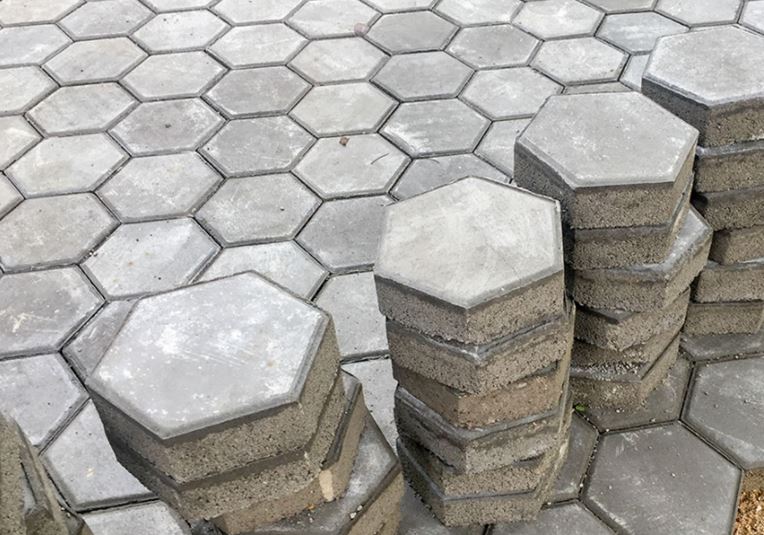
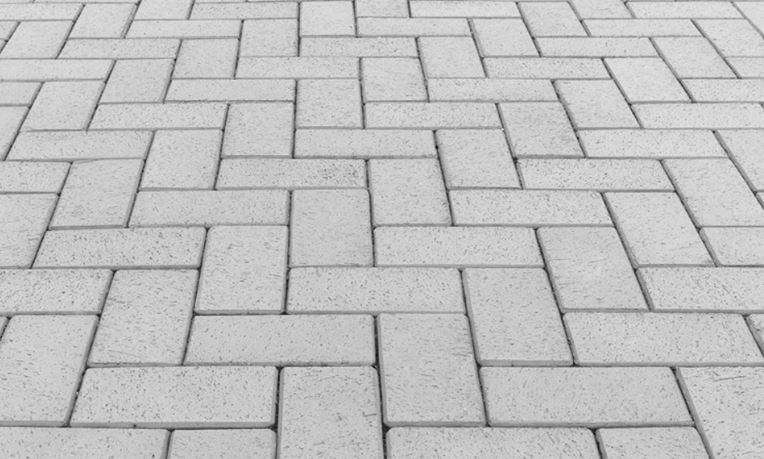
To make concrete pavers, manufacturers pour concrete into molds under a controlled environment to ensure they are stiffer, more robust, and durable.
Pros
- Concrete pavers are the most affordable pavers in the market, a reason why you will find them almost everywhere.
- Harder than concrete, i.e., they have a compressive strength of 55 MPa (8000 psi) as opposed to concrete which has 2500 psi (17 MPa) to 4000 psi (28 MPa), meaning they can bear more load.
- They are available in various designs, textures, colors, or sizes, and you can mix and match them to get the most intricately charming pattern. Whether you are looking for a smooth, cobbled look, natural stone texture, antiqued tumbled appeal, or cool, deep, or warm colors, you will find them. Therefore, these pavers will seamlessly match or complement them with your other exterior features and décor, whether traditional or contemporary.
- Offer better traction than poured concrete, i.e., you won’t sleep even when they are wet, and you can use them immediately after installation.
- Once you have the right subbase, they are easy to install. You can easily cut and arrange these pavers once you decide on the pattern you want instead of some irregular stones.
- Repairing them is a breeze since you can replace an individual piece, and no one will notice any difference.
- They are durable, i.e., they outperform brick pavers in places with higher traffic and can withstand freezing and thawing, i.e., they are individual pieces, which allows the ground beneath to expand or contract without breaking them.
Cons
- The pigmented cement paste and the smooth surface may wear off, showing the beneath gravel and sand as opposed to stones or bricks have the same uniform color throughout their thickness.
- Require sealing to elongate their lifespan, and you may have to replace the in-between sand if it washes away.
- Their quality isn’t consistent as it depends on the individual manufacturer
- They are porous, predisposing them to stains, especially by oil and any colored liquid spills.
- Weeds may grow in between the spaces. Use polymer sand or landscaping fabric to prevent weed growth.
- Cost 15% to 20% more than concrete due to the higher labor costs.
Cost
The average cost of concrete pavers is $4 to $6 per square foot before installation. However, interlocking and some varieties may cost more.
Typical installation cost labor is $6 to $10 per square foot, bringing the total cost of installing concrete pavers to $8-$15 per square foot.
Durability
Are they durable? Yes. With proper care, concrete pavers last anything from 30 to 50 years. However, most manufacturers will give you a lifetime warranty.
Maintenance
They don’t require a lot of maintenance. Just sweep and clean them regularly, remove any stains with appropriate products, and seal them with a good concrete sealer every few years.
2. Brick pavers
The second cheapest paver for patios is brick pavers, which are cast and heat cured clay bricks, which come in primarily rectangular, but other shapes are also available.
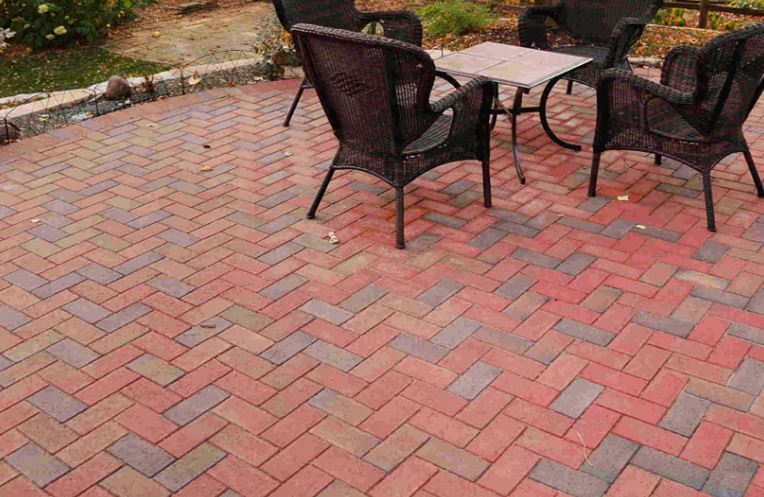
They are available in several colors (depending on the clay used). Therefore, you can mix and match them or create different charming patterns, including herringbone, bond, basketweave, and so on. Installation is by either mortar or sand, just in the case of concrete patio pavers.
Pros
- They look classic, stately, and elegant and a perfect choice for anyone looking to compliment brick homes, creating a traditional appeal and not a contemporary one.
- Brick patio pavers are durable, i.e., can last for several generations, as evidenced by some over a century old brick pavements and buildings. Also, they wear well, leaving a rustic appeal even after extended service.
- Fade-resistant, i.e., they will not lose their color even with heavy traffic since their color isn’t just on the surface.
- Easier to maintain when compared to concrete bricks. Just clean them with water and mild soap. However, sealing them will elongate their lifespan.
- Eco-friendly. These clay bricks last for a long time, use renewable and recyclable raw materials, and their manufacture doesn’t have much carbon footprint.
- Easy to repair
Pros
- They are slightly expensive than concrete pavers by about 15-20%, which can be a big deal if you have an oversized patio.
- More brittle. Compared to concrete pavers, they tend to crack or chip when in places with very high traffic.
- Don’t come in many designs, colors and have pattern limitations.
- Since they are harder to cut, you wind that they are slightly more challenging to install.
- Like concrete bricks, they are susceptible to frost heaving, i.e., upward or outward movement due to ice formation.
Cost
Brick pavers cost $4 and $8 per square foot. This price is exclusive of installation costs which tend to vary from one place to another.
Typically, you will spend between $10 and $20 per square foot to have them installed. While it may look expensive, factoring in the lower maintenance cost, their overall expense won’t be so high.
Durability
Durability isn’t in question when it comes to these clay bricks as they can last for several generations, more prolonged than concrete. However, they may crack or chip and the exact time they ill last depend on usage and weather condition.
3. Porcelain pavers
Porcelain pavers are fully vitrified (fused clays) special types of ceramic tiles. Their kilning happens at a higher temperature, and they are denser, stronger, durable, and more waterproof, making them perfect even for outdoor use.
However, unlike porcelain tiles for interior use, the pavers are thicker, making them ideal for outdoor use. Also, you will find both porcelain setts pavers or plank types.
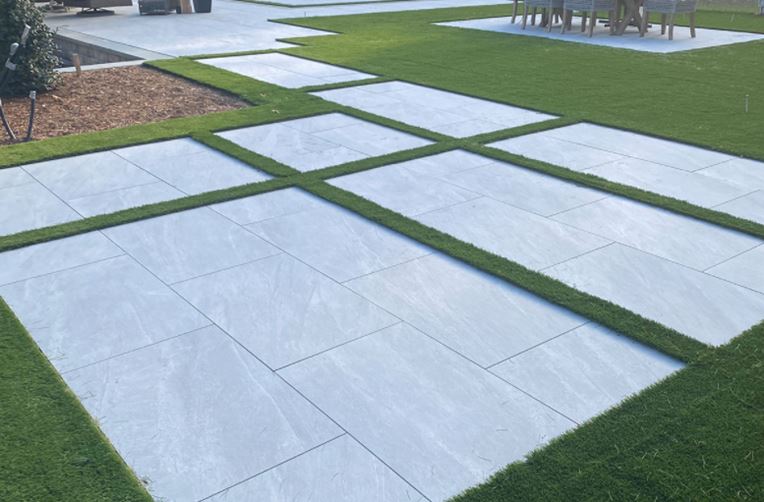
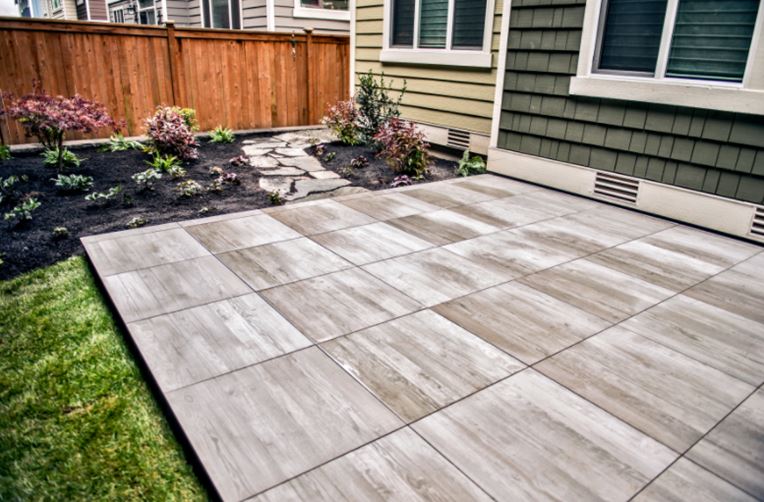
Finally, these tiles come in various colors, patterns, and surface finishes, including those that mimic wood grain and natural stone.
Pros
- Cheaper than stone such as marble, travertine, slate, sandstone, and so on.
- Very charming. You will find various colors, styles, patterns, and sizes, including those made to mimic wood, stone, marble, travertine, metal, or granite in both their colors and textures.
- Durable, i.e., they resist water so well, withstand high traffic, and don’t crack due to freezing and thawing. Also, porcelain resists cracking, chipping, denting, furniture marks. Expect a long service.
- Lighter in weight, i.e., they are often ¾ to 1-⅛ inches thick, making them not as heavy as some stones. Transportation to the job site and installation isn’t challenging. Also, they are easier to replace or install.
- They are easier to clean, i.e., you can use usual house cleaning products and are easier to maintain. Since porcelain pavers have a very low water permeability, they won’t stain easily, cleaning is more straightforward, and they will also not grow mold, mildew, or moss.
- Some are slip or skid-resistant to ensure that kids or older adults slip, especially when wet.
- Resists heat, making them good even near your fire pit
Cons
- Brittle than concrete and may chip, especially at the corners for people with a raised patio. Include a self-adhesive project sheet or metal beneath, if elevated for more than 4 inches, to ensure no injuries if they crack.
- They are tough to cut or drill. Therefore, you will need diamond blades to cut them.
- Not easiest to install. For instance, the subbase needs thorough compaction, and you should ensure it is flat unless you have the 1-⅛” thick tile. Also, dry installation requires a very even and thicker subbase to provide adequate support.
- Cost more than concrete pavers.
Cost
Porcelain pavers cost $7 to $9 per square foot, and installation labor costs about $5 to $10 per square foot. Therefore, expect to spend between $12 and $19 per square foot to install these pavers.
However, the costs may vary depending on the cost of labor and that one of the tiles. Ensure you don’t compromise on quality trying to get something more affordable.
Durability
With proper care, porcelain pavers can last for 75 to 100 years and outlast other paving materials, including concrete pavers or poured concrete.
Maintenance
Porcelain is the easiest cheap pavers for patios since you can clean them with your usual household products.
They are almost impervious to water, unlikely to grow moss, mold, or mildew. However, resealing may help prolong the porcelain’s lifespan.
4.Rubber pavers
Rubber pavers are not so popular since they recently entered the market, and not many people have tried them or know their versatility. Nevertheless, they are an affordable choice not because they have a low buying price but because you can install them even on dirt.
You still doubt, see the 16″ by 16″ rubber patio on dirt with a weed prevention fabric and Brock Paver Base. It looks amazing.
If you are interested, try Rubberific or Envirotile and see what they have. Also, there are many other manufactures in the market.
Manufacturers recycle tires to make rubber pavers, making them one of the most eco-friendly choices in the market that effectively competes with bricks, concrete, or stone pavers.
Also, their patterns may resemble cobblestones, bricks, stones, interlocking tiles, and you will get them in various colors like terracotta, natural stone, traditional brick, etcetera.
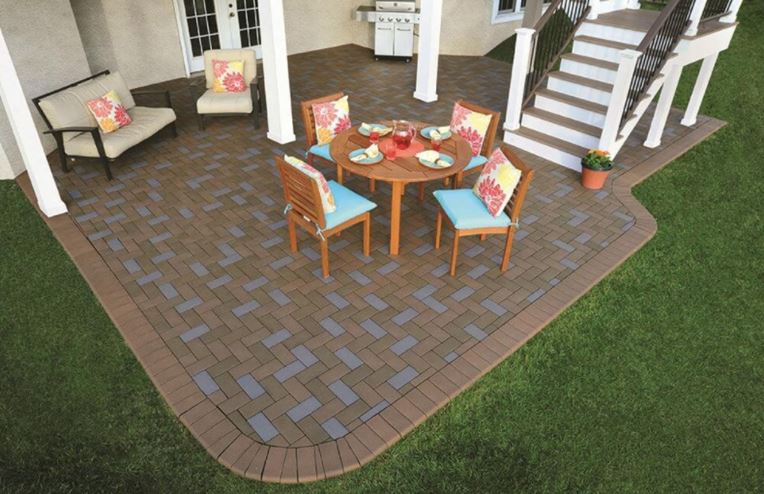
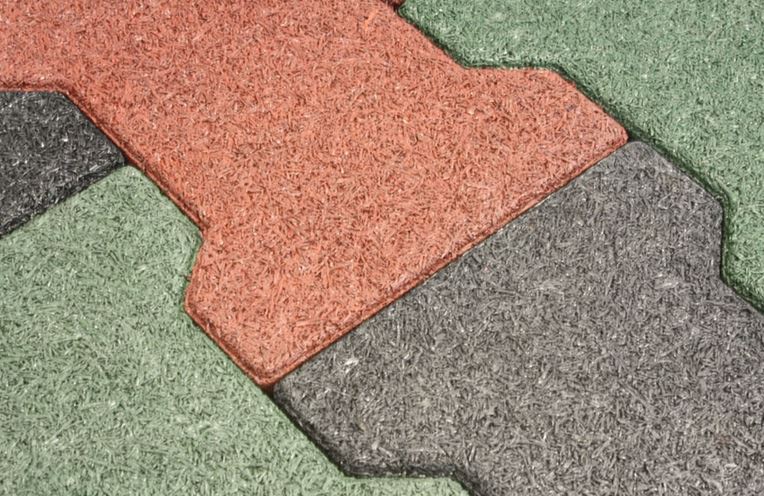
Pros
- Comfortable to walk on since they absorb shock when compared to stone, brick, or concrete pavers. Therefore, they are suitable for kids and the elderly.
- Slip-resistant even when wet, when some materials, unless given a special anti-slip surface treatment, will be slippery.
- Eco-friendly. Since manufacturers recycle old car rubber tires that would have otherwise ended in dumpsites, they are the most eco-friendly patio material.
- They don’t crack, chip, or crack
- You can install them on dirt. Also, being flexible, installation doesn’t require an impeccably even or flat subbase, and they are easy to cut.
- They don’t freeze even in winter, and ice will quickly thaw from their surface.
- They don’t hold moisture or harbor bacteria
Cons
- They fade fast when compared to the other paving material when exposed to excessive UV light.
- Less aesthetically pleasing, i.e., not available in as many designs, colors, and textures as concrete or brick pavers.
- May shift if you don’t have an edge.
- Some people complain of a slight order, especially when it is scorching. However, so far, we haven’t noticed the issue.
Cost
The cost of rubber pavers is $7 to $15 per square foot, with so many brands going for less than $10 per square foot. What makes them affordable and fall on this list of our cheapest pavers for the patio is that you can install them even on dirt.
They are large and effortless to install. You won’t incur the costs of an expensive subbase as in the case of other pavers.
Durability
They are durable and resist wear and tear, just as tires do even when exposed to very harsh conditions. They will serve you for a long time. Unfortunately, they tend to fade under sunlight.
Maintenance
Maintenance is an easy affair. All you need to do is to mop their surface regularly. Additionally, you will have to use a high-pressure hose periodically for a more thorough cleaning.
What else?
If you still haven’t the perfect pavers, you need to consider stone pavers where you will decide from the many available that include:
- Flagstones including Yorkstone,
- Limestone
- Travertine
- Sandstones, including Indian sandstone
- Bluestones
- Basalt
- Slate
- Granite
- Marble
- Decomposed granite

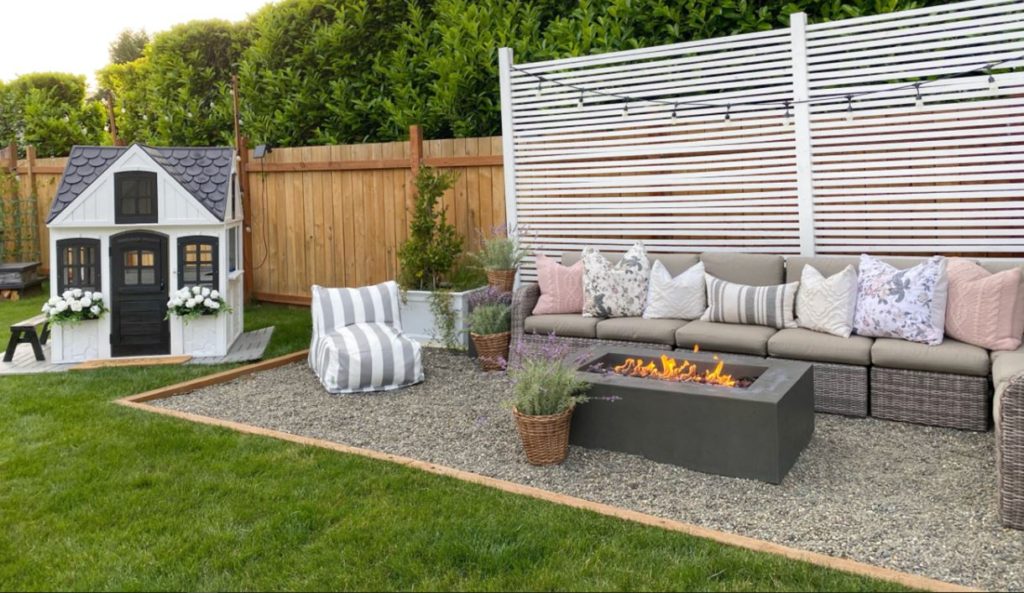
Leave a Reply